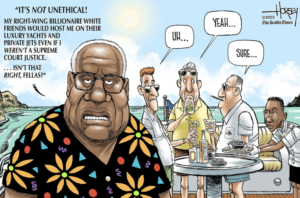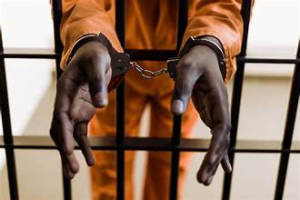Published in The St. Louis American July 30, 2023
Former Congressman William Clay warned the nation about Clarence Thomas back in 2015.  But we knew well before his book, “Clarence Thomas: A Knight in Tainted Armor” was published that this was no knight in shining armor.
But we knew well before his book, “Clarence Thomas: A Knight in Tainted Armor” was published that this was no knight in shining armor.
When Justice Thurgood Marshall retired from the U.S. Supreme Court in 1991, then U.S. Senator John Danforth from Missouri lobbied President Bush to nominate Thomas for the open seat. Justice-loving people in St. Louis fought like hell against the nomination. We were fully aware of the consequences that his confirmation would have on the country. A courageous Anita Hill exposed Thomas’ sexual harassment, drawing the support of women’s groups. We all did our parts to stop the confirmation but to no avail. The Senate approval vote was the thinnest margin in over 100 years.
We must move quickly to let our representatives know that Uncle Thomas must be targeted for impeachment. A clear message must prevail that judicial seats are not up for sale.
There was never an expectation that Clarence Thomas could fill the big, judicial shoes of Thurgood Marshall. Maybe there was some reasonable thinking that Thomas had the acumen to interpret the law based upon the Constitution while staying independent from special interests. He did not.
It’s almost incomprehensible to know that Thomas’ early politicization embraced his Blackness. He abandoned the pursuit to become a Catholic priest because he felt the church wasn’t doing enough to fight racism. At his undergraduate college, Thomas helped to establish the Black Student Union. He engaged in anti-war protests and sit-ins against racism. A Malcolm X poster even hung in his dorm room.
I don’t know what happened to Thomas after he left Harvard Law school in 1974. I do know that when he left Missouri, he morphed into a self-loathing, misogynistic person void of moral character.
Justice Thomas rarely asked questions from the bench during oral arguments. According to Clay’s book on the muted justice, he asked absolutely no questions for an entire decade.
Behind the scenes, Thomas was talking plenty—to his sugar daddy, Harlan Crowe. For years, the billionaire has lavished the Thomas family with private jet flights, luxury vacations and more. Crowe also paid for the college tuition of a relative raised by the Thomases.
Crowe’s investment guaranteed a friendly vote on the court when his cases made their way up the chain. Thomas saw no need to disclose the gifts or recuse himself. This is corruption at the highest level of the judicial system.
Congressman Bennie Thompson and other Black folks have called the justice Uncle Tom for years. Minnesota Attorney General Keith Ellison once referred to Thomas as the house negro, Stephen, in the movie “Django Unchained”. Thomas’ behavior is more than embarrassing buffoonery and while the name-calling may sully his reputation in the annals of Black History, it hasn’t stopped his detrimental rulings.
There’s enough known evidence to show that Thomas is unfit to serve in this prestigious position. The House of Representatives can impeach a Supreme Court justice with a simple majority.
Right now, the Democrats have a slight numerical edge but who knows what could happen in 2024. We must move quickly to let our representatives know that Uncle Thomas must be targeted for impeachment. A clear message must prevail that judicial seats are not up for sale.
The next battle in the war is imposing term limits on the U.S. Supreme Court. The country can’t endure a lifetime of justices like Clarence Thomas.
The chorus to impeach Thomas has been growing louder since Clay’s book was published in 2015. It’s time to bring this tragic fairytale to an end; this knight is a national nightmare.
Jamala Rogers is a columnist for The St. Louis American and one of the founding members of the Organization for Black Struggle based in St. Louis, Missouri.



